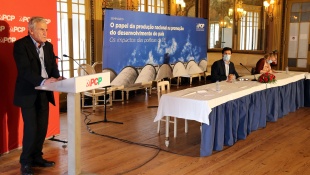Following the decision by the European Central Bank (ECB) to increase the reference interest rate to 4%, after eight consecutive increases, anticipating a new increase in July, the PC´s MPs in the European Parliament took the initiative to promote a letter signed by several MPs from different Member States and political groups, addressed to the European Council, the European Commission and the European Central Bank.
-/-
Hon. President of the European Council, Charles Michel
Hon. Madam President of the European Commission, Ursula Von Der Leyen
Hon. Madam President of the European Central Bank, Christine Lagarde
Subject: On the consecutive increase in reference interest rates declared by the ECB and its impacts on workers and families
Following successive increases, in its latest monetary policy meeting, the European Central Bank (ECB) set the reference interest rate at 4%. This is a decision with impacts, among others, on housing mortgage loans, representing an increase of 0.25 percentage points compared to the value set at the beginning of May. In addition, the ECB also announced a further hike next month.
The European Parliament discussed, in the May plenary session, the impacts of the ECB's monetary policy in the various countries, particularly in those where variable rate loans predominate. In this debate, commissioner Nicolas Schmit stated that “the risks of a wage-price spiral seem extremely contained”, pointing to ECB studies which conclude that “the increase in profits was significantly more dynamic than the increase in wages”. He also referred that “inflation is highly regressive”, that is, that “it affects the poorest families and people with particular acuteness, given that they spend a greater percentage of their income on food and energy consumption”, presenting estimates that inflation will have contributed to “increase poverty and social deprivation by 5 percentage points in the EU, with important differences among Member States”.
Despite this, and after the announcement of the entry into recession of the Euro Zone, the ECB insists on promoting a restrictive monetary policy on demand, with profound, but differentiated, impacts on workers and their families in several Member States.
Furthermore: the ECB, in addition to preparing new hikes in interest rates in the short term, confirms the non-repurchase of public debt assets, which tends to put greater pressure on the funding of some States, and threatens with measures that place even greater pressure on wages, despite the fact that they have already suffered a cut in their real value.
We are facing a policy that heightens injustice and social inequalities. On the one hand, it contributes to the unbearable worsening of housing loan payments, leading to a significant reduction in household disposable income, while also contributing to hamper the funding capacity of micro, small and medium-sized enterprises (MSMEs) and of the states themselves. On the other hand, it benefits the banking sector, which, by immediately passing on the rate hikes on loans, but not on deposits, uses the opportunity to significantly increase its net interest income and profits.
In view of the above, the signatories consider that the situation created by the successive decisions of the ECB reinforces the need to promote a discussion on the lack of democratic scrutiny of the decisions of this institution, despite their profound economic, social, and political impacts. In addition, the signatories defend the need for the following measures:
- Halt and reverse the increase in interest rates, given the consequences it is having on workers and their families, on MSMEs and on the States; meanwhile, immediately, ensure that the impact of the increases already decided is supported primarily by the banks' growing profits and not by families and MSMEs;
- Increase in wages and pensions, ensuring purchasing power;
- Regulation of prices of essential goods and services;
- Combat speculation and taking advantage of rising prices to increase profits;
- Taxation of profits of large economic groups to promote development and social progress;
- Boost national production in the different Member States, whether of consumer goods or production goods, including in the energy sector, boosting the use of the endogenous potential of renewable energies, and contributing to stabilising production and distribution chains.
The Members of the European Parliament:
João Pimenta Lopes, Portugal
Sandra Pereira, Portugal
Ana Miranda, Spain
Clare Daly, Ireland
Fabio Massimo Castaldo, Italy
Giorgos Georgiou, Cyprus
Idoia Villanueva, Spain
José Gusmão, Portugal
Kateřina Konečná, Czechia
Konstantinos Arvaniti, Greece
Leïla Chaibi, France
Luke Ming Flanagan, Ireland
Manu Pineda, Spain
Marc Botenga, Belgium
Maria Eugénia Palop, Spain
Marina Mesure, France
Marisa Matias, Portugal
Martin Schirdewan, Germany
Mick Wallace, Ireland
Miguel Urban, Espanha
Monika Beňová , Slovakia
Niyazi Kizilyürek, Cyprus
Sabrina Pignedoli, Italy
Sira Rego, Spain
Steilios Kouloglou, Greece
Tatjana Ždanoka, Latvia

